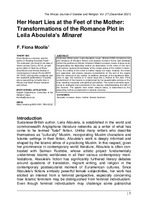Her heart lies at the feet of the mother: Transformations of the romance plot in Leila Aboulela’s minaret
Abstract
Sudanese-British writer, Leila Aboulela’s novel, Minaret (2005) transforms the
plot structure of Western literary and popular romance forms and develops
further the plotlines of African-American Muslim romance novels. It does so by
foregrounding the dissenting mother as obstruction to the union of the hero
and heroine, against the backdrop of the unique status of the mother in Islam.
Thus, the ending of the novel is neither happy nor tragic. Instead, the lovers
are separated, and closure requires reconciliation on the part of the couple
with the concerns of the mother. In addition, because of the significant difference in age, the heroine is in some ways like a mother to the hero. Final
contentment of the heroine is undermined by her questionable actions at the
end, resulting in psychic and spiritual contraction. The novel is therefore opened up to ambiguity and uncertainty in the closure, notwithstanding the faith of
the heroine. The specific form which closure takes, is determined by the
dissenting mother as obstruction in Islamic romance.

